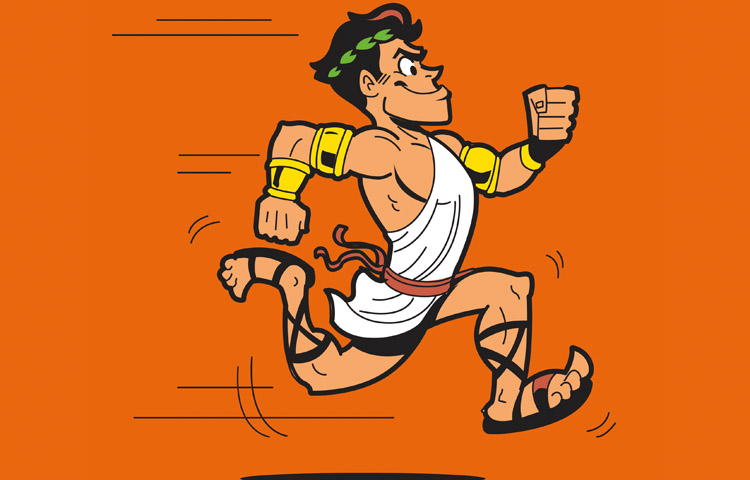
The original story of the marathon is well known – and, very likely, completely wrong.
It goes something like this: a Greek messenger, Pheidippides, ran 26 miles from Marathon to Athens to bring news of the Athenian victory over the invading Persians. Message communicated, he promptly dropped dead from exhaustion.
The real story – or, at least, the one considered by historians to be somewhat more likely – is far more remarkable.
It sees our hero, Pheidippides, running from Athens to Sparta, a distance of approximately 150 miles, to ask for the Spartans’ help in fighting the Persians. Alas, he was met by crushing news: the Spartans were observing their religious festival and, as a result, refused to set out until the full moon.
This was doubly bad for Pheidippides: not only was he without the Spartans’ support, he also had to run all the way back to deliver the bad news.
Fortunately, Pheidippides – or so the legend goes – met with the god Pan on the return leg. Pan told him to ask the Athenians why they paid him no attention, in spite of his friendliness towards them and the fact that he had often been useful to them in the past, and would be so again in the future.
In return for the Athenian’s renewed respect towards him, Pan fought alongside them and, despite them being hopelessly outnumbered, helped them to drive back the Persians to their ships. It was a stunning victory – but neither the battle nor the running ceased there.
Running battle
The Persians had a new plan: to sail around Cape Sounion to arrive on the beach at Phaleron and march on an undefended Athens. The trip would take the boats between eight to 10 hours. Some suggest this was Pheidippides’ cue to start running again: this time from Marathon to Athens to warn the Athenians that the Persian fleet was on its way.
It is this journey that may account for the legendary 26-mile run of Pheidippides. He was, indeed, running back to announce victory, but also to warn his people about another attack. And he did, very possibly, die along the way, likely from accumulative exhaustion.
Behind him, the battle-weary Athenians had to do some running of their own if they were to get to Phaleron before the Persians. Exhausted, bloodied, and carrying their weapons and wounded, the Athenians nonetheless made the 26-mile journey, arriving just an hour or so before the first Persian ships.
The Persians were rightly stunned when they saw the beaches lined with thousands of Greeks ready for battle. And, despite still being stronger in number, the Persians decided better of it and turned their ships around.
Spartathlon
The ‘Men of Marathon’ were heralded as heroes, as much for their running as their fighting, and the tale of Pheidippides came to symbolise the greatness of soldiers and the role of the deities.
While Pheidippides is best known for having inspired the modern marathon, his running heroics are also replicated each year at the Spartathlon. A 153-mile race from Athens to Sparta, with a strict cut-off time of 36 hours, the race aims to retrace the footsteps of the great Greek messenger. Starting life in 1983, it now attracts ultrarunners the world over and is considered one of the most prestigious – not to mention preposterously difficult – footraces in the world.
A fitting tribute, then, to Pheidippides: the world’s first true running hero.






